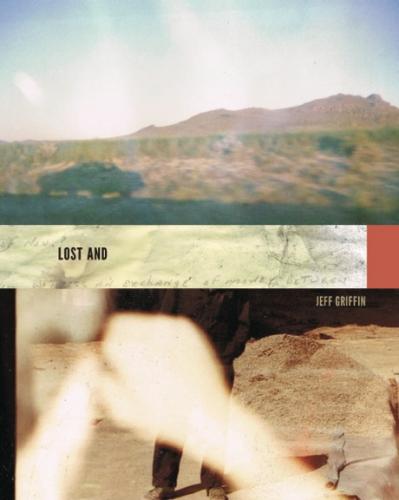 Lost And
Lost And
by Jeff Griffin
University of Iowa Press, October 2013
174 pages, Buy from Amazon
I’ve been a big fan of Jeff Griffin’s work since he added me on facebook, years ago when I lived in DeKalb, IL and still had an account. I published an excerpt of Luxury Arcana, a collaborative work that Griffin produced with his compatriots Jerimee Bloemeke and Henry Fitch, in an early issue of LIES/ISLE. I became a dedicated fan of Human 500, Griffin & Bloemeke & Finch’s press, purchasing everything they put out.
One of my favorite books that Human 500 put out was There’s Never Been a Day That Didn’t Require Knives Like These (which you can hear Jeff talk about here), which is ostensibly an early version of the beautiful book LOST AND. I read it hung over after I had missed the train leaving Chicago taking me back closer to the shithole of DeKalb, IL which I called home at the time. In the state of being hung over the book carried a heavy affect that resounded through my aching bloodstream. I was astounded by the, perhaps let’s say, purity, or maybe even authenticity (though as a friend once said, “Nobody cares about authenticity other than Lorde”) that carried the tone of the assemblage. Thick for a chapbook, but totally comprehensive.
Later, in 2013, when I found out Jeff had a perfect bound book coming out I was thrilled, as Jeff’s work is great. I was in California at this point, my life was a lot different, and the reality was the abundance of freetime I had formerly held as my domain had all but vanished. I requested an ARC of the book because I was broke (I’m always broke, I live paycheck to paycheck from shitty retail jobs while I try to maintain the illusion of being an “artist”), excited to read it and write about the book. Eventually, the book came, and for whatever reason, the book got pushed aside.
I found the book last weekend and flipped through it for the first time. The book is gorgeous. It combines typed up transcripts of found material, as well as direct reproductions of found material (both texts and photographs, drawings, dirt). At times the materiality can remind one of Artaud’s late notebooks, scrawled, punctured, burned–Artaud was imbibing the page with his body, the page was becoming body, the body was to carry the spell, the message, the body without organs was to become the text.
The texts found in Lost And seem apart from a day to day reality that one who, presumably, is buying a poetry book published by a university press, inhabits. It seems otherworldly. The most shocking thing about the book, perhaps, is that most of the photos and texts found therein are from either the 90s or the early 2000s. This is not a world ago, this is our immediate past.
The presentation of found texts devoid of commentary can be a tricky thing, especially when the content (the found material) itself is explicitly indicative of the lower class. I find this fascinating. A condescending sense of dismissal could cite the material as coming from presumed “trailer trash,” as the material was indeed found in abandoned trailers in various empty desert communities of the west. But the fascination I find is that there is no condescension present: the material, in it’s curation, is not paired ironically or illustratively, there is no judgement being passed. Rather, there’s almost a sense of love present, a love for the materiality of what’s been found, the pure core of the work being language/the signifier, constructed into an entropic monument to how fucked up humans are in general.
Hierarchical consideration of humanity inherently leads to bigotry and the quest for power: both these things are what has made the world horrible. As radicals are often wont to remind us, we’re all humans: the insidiousness of the nazi party & concentration camps in WWII was not an alien force violating the world: these were acts and ideas committed by humans. Which is to say, this is not the other, this is us. Griffin’s book refuses the hierarchy in its insistence that the found material should sit alongside academic poetics: it disassembles the idea that the aesthetics of poetry sit above or beyond something. It reminds us that the best thing one can do is to pay attention.
Tags: affect, anti-conceptual conceptual work, consideration of the other, found material, jeff griffin, lost and, overwhelming, Reviews, the desert

This rules.